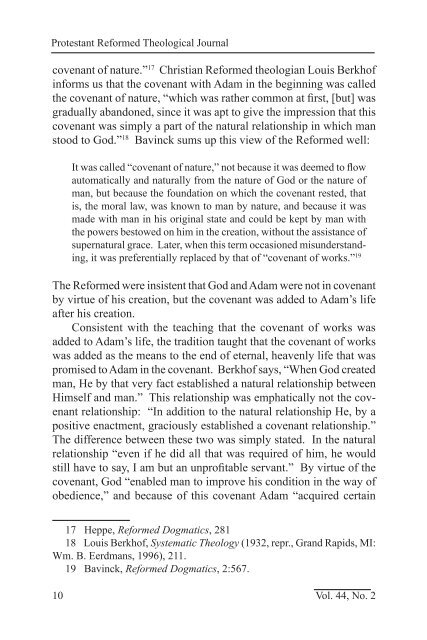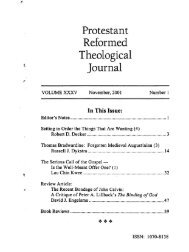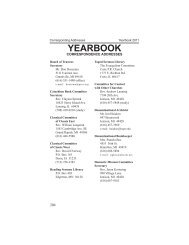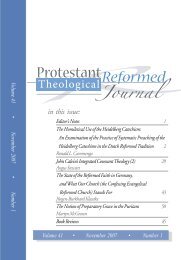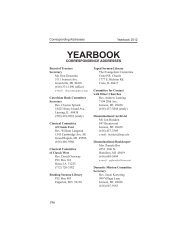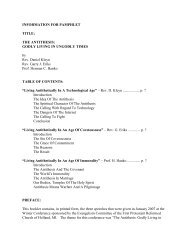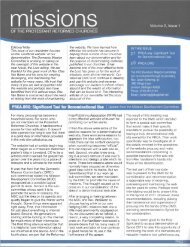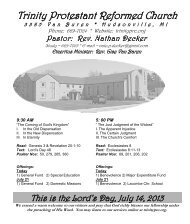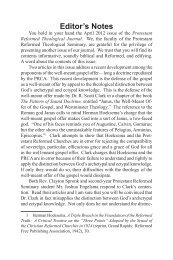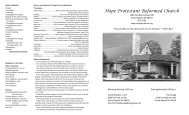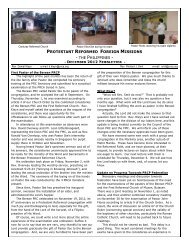A Critique of the Covenant of Works in Contemporary Controversy
A Critique of the Covenant of Works in Contemporary Controversy
A Critique of the Covenant of Works in Contemporary Controversy
Create successful ePaper yourself
Turn your PDF publications into a flip-book with our unique Google optimized e-Paper software.
Protestant Reformed Theological Journal<br />
covenant <strong>of</strong> nature.” 17 Christian Reformed <strong>the</strong>ologian Louis Berkh<strong>of</strong><br />
<strong>in</strong>forms us that <strong>the</strong> covenant with Adam <strong>in</strong> <strong>the</strong> beg<strong>in</strong>n<strong>in</strong>g was called<br />
<strong>the</strong> covenant <strong>of</strong> nature, “which was ra<strong>the</strong>r common at first, [but] was<br />
gradually abandoned, s<strong>in</strong>ce it was apt to give <strong>the</strong> impression that this<br />
covenant was simply a part <strong>of</strong> <strong>the</strong> natural relationship <strong>in</strong> which man<br />
stood to God.” 18 Bav<strong>in</strong>ck sums up this view <strong>of</strong> <strong>the</strong> Reformed well:<br />
It was called “covenant <strong>of</strong> nature,” not because it was deemed to flow<br />
automatically and naturally from <strong>the</strong> nature <strong>of</strong> God or <strong>the</strong> nature <strong>of</strong><br />
man, but because <strong>the</strong> foundation on which <strong>the</strong> covenant rested, that<br />
is, <strong>the</strong> moral law, was known to man by nature, and because it was<br />
made with man <strong>in</strong> his orig<strong>in</strong>al state and could be kept by man with<br />
<strong>the</strong> powers bestowed on him <strong>in</strong> <strong>the</strong> creation, without <strong>the</strong> assistance <strong>of</strong><br />
supernatural grace. Later, when this term occasioned misunderstand<strong>in</strong>g,<br />
it was preferentially replaced by that <strong>of</strong> “covenant <strong>of</strong> works.” 19<br />
The Reformed were <strong>in</strong>sistent that God and Adam were not <strong>in</strong> covenant<br />
by virtue <strong>of</strong> his creation, but <strong>the</strong> covenant was added to Adam’s life<br />
after his creation.<br />
Consistent with <strong>the</strong> teach<strong>in</strong>g that <strong>the</strong> covenant <strong>of</strong> works was<br />
added to Adam’s life, <strong>the</strong> tradition taught that <strong>the</strong> covenant <strong>of</strong> works<br />
was added as <strong>the</strong> means to <strong>the</strong> end <strong>of</strong> eternal, heavenly life that was<br />
promised to Adam <strong>in</strong> <strong>the</strong> covenant. Berkh<strong>of</strong> says, “When God created<br />
man, He by that very fact established a natural relationship between<br />
Himself and man.” This relationship was emphatically not <strong>the</strong> covenant<br />
relationship: “In addition to <strong>the</strong> natural relationship He, by a<br />
positive enactment, graciously established a covenant relationship.”<br />
The difference between <strong>the</strong>se two was simply stated. In <strong>the</strong> natural<br />
relationship “even if he did all that was required <strong>of</strong> him, he would<br />
still have to say, I am but an unpr<strong>of</strong>itable servant.” By virtue <strong>of</strong> <strong>the</strong><br />
covenant, God “enabled man to improve his condition <strong>in</strong> <strong>the</strong> way <strong>of</strong><br />
obedience,” and because <strong>of</strong> this covenant Adam “acquired certa<strong>in</strong><br />
17 Heppe, Reformed Dogmatics, 281<br />
18 Louis Berkh<strong>of</strong>, Systematic Theology (1932, repr., Grand Rapids, MI:<br />
Wm. B. Eerdmans, 1996), 211.<br />
19 Bav<strong>in</strong>ck, Reformed Dogmatics, 2:567.<br />
10<br />
Vol. 44, No. 2


